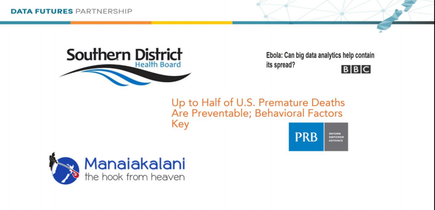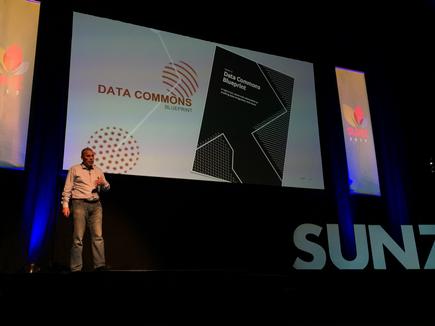
We need to be careful that just because we have that data we can use, doesn’t mean we should
“We are developing new types of technology allowing us to do things with data that we did not dream about 10 years ago, five years ago, even two years ago.
“We have more and more data flowing through than we can start to use.
“But just because we have all the data and just because we have the technology, should we be doing things with it?”
Dame Diane Robertson, chair of the Data Futures Partnership, lays out this challenge facing organisations that are collecting and holding greater volumes of data.
Robertson, who spoke on ‘Trusted and Ethical Data Use’ at the recent SAS Users of New Zealand (SUNZ) conference in Wellington, adds this question to the mix: “What are the things we shouldn’t be doing with it?”
The Data Futures Partnership is an independent group that was created in 2015 by the government to develop innovative solutions to data-use issues.

Trusted data use is an important part of this, says Robertson at the conference, which was attended by analytics professionals.
The partnership is working with New Zealanders to develop social license guidelines for data use. The guidelines, according to the Data Futures Partnership website, will set out the ways in which those working with data can build confidence by using data safely and in a way that will be of benefit to individuals and the wider public.
"I am passionate about the power of data and how trusted data sharing can be used to change lives for the better," she says, of her role.
At the SUNZ conference, Robertson discusses the concept of ‘social license’.
Social license is “when people trust that their data will be used as they have agreed, and accept that enough value will be created, they are likely to be more comfortable with its use.”
“We need a framework for social license,” she says. “Social license is not something you give yourself.”
“There are lots of things that can be done with data,” she states. “But are they right?”
To illustrate, she shows contrasting samples of positive - and otherwise - use of data.
A recent example of the latter was when the Ministry of Social Development asked not for profits to give them personal data, not just data about clients themselves but data about clients' children and clients’ partners.
The not for profits replied, ‘No, you can’t have it, and we think you are breaching the privacy of our clients and that we think this is not a good thing to do’.
“We need to be careful that just because we have that data we can use, doesn’t mean we should,” Robertson says.


A positive use of data is the Southern District Health Board’s HealthOne, where patient data is shared between between doctors, pharmacists and ambulance service to provide the best possible picture of the patient.
In an accident, the hospital can treat a patient efficiently and quickly, for instance, when they know if the patient has any medical complications such as allergies.
She cites another initiative, Manaiakalani, an education programme to help improve students outcomes for low decile schools in Auckland.
“We can see where good examples of data is shared and technology is used with great outcomes for people.
“When you get it right, the benefits are clear,” she says.
What is social licence? Presentation from @nzdatafutures who are creating social licence guides for data use.
— Open Data NZ (@opendatanz) June 7, 2017
https://t.co/5nsrt0PlOO
Lessons from the field
Robertson was head of the Auckland City Mission before her current role.
During her term, the City Mission had a research project called Family 100, where they interviewed families living in poverty. The participants provided detailed information on a wide range of relevant topics including housing, food, services, education, justice, debt, employment, health and support networks.
She says the families were asked to describe the organisations they visited in a span of two weeks. These included government agencies (e.g. social services and justice), health networks, debt agencies and churches.
“Often these families get told ‘to get a job’,” she says. “They have got a job, it takes all of their time to go around all of these agencies.”

Every time they go to these agencies, they are asked the same questions - like their name, birthdate, the last time they were here, the number for their benefit.
“Data is collected and collected,” she says. “Every time they go to another agency, they [answer] the same formula questions.”
Some data will be different or peculiar to some agencies.
“All the demographics are just the same. They go to an agency, they are seeking help for something. They have to give the story every agency wants to hear.
“How much easier [it would be] if these families could actually have one source where data is collected, where the data is shared around the system, where they don't repeat it every time they go in.”
She says clients would like this to happen.
Robertson says some of the families are asking why they can not have an app to get their own benefit, or to look at their debt?
“We have apps on the phone that we use,” says Robertson, “and yet, we expect these families to walk around the system and share the data with everybody, repeating the data and having it collected.”
She says she asked families, “what value did you get out of this”, after meeting with the agencies over the two weeks.
“Most of them would say, ‘little or nothing’,” she states. “Think about the cost and the outcomes for the way we collect and use data for families. It is inefficient, it is not held and it is not shared, and does not create better outcomes for people who are in these systems.”
She says her work at Data Futures is about social investment. “I am passionate about using data better to get improved outcomes for families,” she says and also to include people in that conversation.
She says the partnership has held a series of workshops nationally, from Invercargill to Whangarei, on how New Zealanders feel about their data being used and shared.
The participants were across a broad section of people, including Pasifika, rural/urban, homeless, school students and older people. There were also 4000 people who were involved using an online version of the workshops.
Interesting and thought provoking, "The partnership is working with New Zealanders to develop social license guidelines for data use" https://t.co/MstYk3pdLm
— Peter Rowe (@SLO_Djinn) June 7, 2017
They used three hypothetical data use scenarios for medical data, education records and smart street lighting.
The research explored people’s comfort levels and how they weigh-up trust/benefit in the different scenarios.
For instance, when it came to health data, there was a value proposition, to the doctor and ambulance paramedics, and to the person who is being treated more effectively and efficiently.
“When there is no value proposition, they want to know what you are going to use it for, how it is going to be used, they want to know about control,” explains Robertson.
The people were also asked how they would feel if their anonymised data was used to develop policies, and given to business, iwi and government.

I am passionate about the power of data and how trusted data sharing can be used to change lives for the better
When people were asked what they think the guidelines should contain, certain themes emerged.
These include purpose (what will it be useful for?), value (what will I get out of it, what will you get out of it?), use (what are you going to use it for?) and control (informed consent and the ability to remove permission as well as time limits on permission).
One of the biggest issues is that people don't trust the data held about them is accurate and want to access it look at it and check if it is accurate and valid.
She says other themes that emerged were security (data breaches) and transparency.
As well, they want a governance body, a form of Data Commission, an independent authority that deals with complaints.
“More and more of data is being collected about us that we don't necessarily have control of,” she states. Photos are taken of people as they walk down the street, or their information is collected as they swipe their bus cards.
“We should have control of how data is being used. Is it being used for our benefit, or is it being used as a deficit model against us?”
“Social license is going to be the biggest issue around data,” she states.
“Underneath all that, you have to determine how to use it, its purpose, its value, its security and its control. But most of all, what you need to be doing is having a good engagement with the people you are developing products for data use, to understand how it can benefit people and for people to understand the benefits for them.
“We need to remember one of our biggest jobs is to extract the value from data,” she tells the SUNZ conference attendees.
“We need to start thinking, what’s the value, what’s the risk, and how to mitigate the risk."
“Collect the right data,” she continues. “Get as much value as we can, to make New Zealand a fantastic place to live in.”

Send news tips and comments to divina_paredes@idg.co.nz
Follow Divina Paredes on Twitter: @divinap
Follow CIO New Zealand on Twitter:@cio_nz
Join the CIO New Zealand group on LinkedIn. The group is open to CIOs, IT Directors, COOs, CTOs and senior IT managers.
